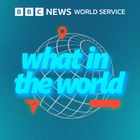
What in the World
Aug 14, 2024
Sharks off the coast of Brazil recently tested positive for cocaine in lab research by The Oswaldo Cruz Foundation. It was the first study to detect cocaine in the species. It’s not yet known how the drug affect the predators.
It’s not just sharks ingesting man-made substances. Marine experts have found traces of painkillers, contraceptive pills, anti-depressants and MDMA in other aquatic creatures. Crabs and fish have demonstrated significant behavioural and psychical differences as a result.
We get a round up of the research from Alex Ford, a professor of biology at the University of Portsmouth. He explains how recreational drugs and medicines have been found in seawater samples in the U.K. and how that could impact animal behaviour and development.
Instagram: @bbcwhatintheworld Email: [email protected] WhatsApp: +44 0330 12 33 22 6 Presenter: Hannah Gelbart Producers: William Lee Adams and Benita Barden Editor: Verity Wilde

